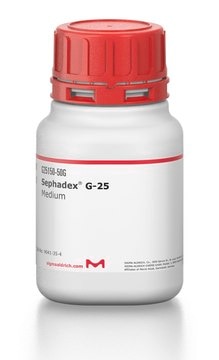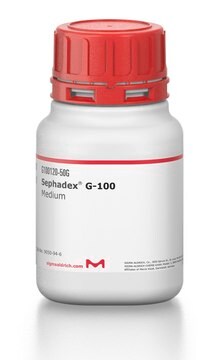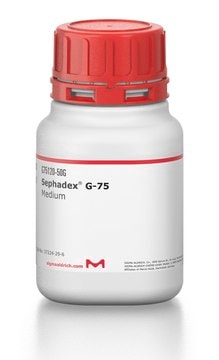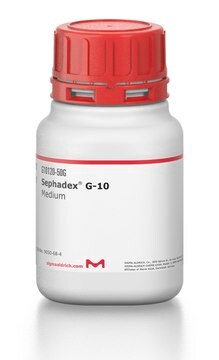S5897
Sephadex® G-50
BioReagent, for molecular biology, DNA grade, fine
About This Item
Recommended Products
grade
DNA grade
for molecular biology
product line
BioReagent
form
beads
technique(s)
DNA purification: suitable
matrix
cross-linked dextran
swelling
1 g swells to 9-11 mL
bead diameter
20-80 μm
pore size
exclusion limit (20 bp dsDNA (rA)20)
pH
2-10
foreign activity
DNase, RNase, none detected
storage temp.
room temp
InChI
1S/C18H32O16/c19-1-5(21)9(23)10(24)6(22)3-31-17-16(30)14(28)12(26)8(34-17)4-32-18-15(29)13(27)11(25)7(2-20)33-18/h1,5-18,20-30H,2-4H2
InChI key
FZWBNHMXJMCXLU-UHFFFAOYSA-N
Looking for similar products? Visit Product Comparison Guide
General description
S5897-100G′s updated product number is GE17-0573-02
Application
Features and Benefits
- Excellent recovery
- Minimal sample dilution
- Quick and easy to use
Legal Information
related product
Storage Class Code
11 - Combustible Solids
WGK
WGK 3
Flash Point(F)
Not applicable
Flash Point(C)
Not applicable
Personal Protective Equipment
Regulatory Listings
Regulatory Listings are mainly provided for chemical products. Only limited information can be provided here for non-chemical products. No entry means none of the components are listed. It is the user’s obligation to ensure the safe and legal use of the product.
JAN Code
S5897-100G:
S5897-VAR:
S5897-BULK:
S5897-25G:
Certificates of Analysis (COA)
Search for Certificates of Analysis (COA) by entering the products Lot/Batch Number. Lot and Batch Numbers can be found on a product’s label following the words ‘Lot’ or ‘Batch’.
Already Own This Product?
Find documentation for the products that you have recently purchased in the Document Library.
Our team of scientists has experience in all areas of research including Life Science, Material Science, Chemical Synthesis, Chromatography, Analytical and many others.
Contact Technical Service








